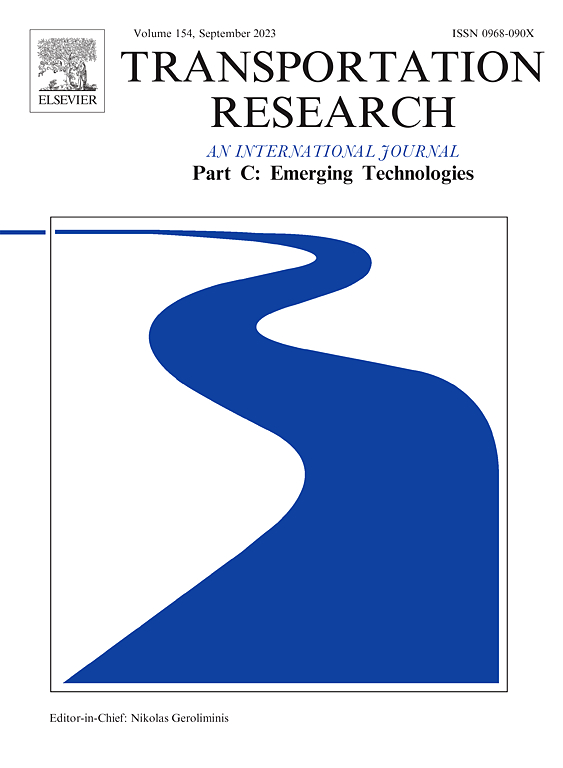Mitigating stop-and-go traffic congestion with operator learning
IF 7.6
1区 工程技术
Q1 TRANSPORTATION SCIENCE & TECHNOLOGY
Transportation Research Part C-Emerging Technologies
Pub Date : 2024-11-22
DOI:10.1016/j.trc.2024.104928
引用次数: 0
Abstract
This paper presents a novel neural operator learning framework for designing boundary control to mitigate stop-and-go congestion on freeways. The freeway traffic dynamics are described by second-order coupled hyperbolic partial differential equations (PDEs), i.e. the Aw–Rascle–Zhang (ARZ) macroscopic traffic flow model. The proposed framework learns feedback boundary control strategies from the closed-loop PDE solution using backstepping controllers, which are widely employed for boundary stabilization of PDE systems. The PDE backstepping control design is time-consuming and requires intensive depth of expertise, since it involves constructing and solving backstepping control kernels. Existing machine learning methods for solving PDE control problems, such as physics-informed neural networks (PINNs) and reinforcement learning (RL), face the challenge of retraining when PDE system parameters and initial conditions change. To address these challenges, we present neural operator (NO) learning schemes for the ARZ traffic system that not only ensure closed-loop stability robust to parameter and initial condition variations but also accelerate boundary controller computation. The first scheme embeds NO-approximated control gain kernels within a analytical state feedback backstepping controller, while the second one directly learns a boundary control law from functional mapping between model parameters to closed-loop PDE solution. The stability guarantee of the NO-approximated control laws is obtained using Lyapunov analysis. We further propose the physics-informed neural operator (PINO) to reduce the reliance on extensive training data. The performance of the NO schemes is evaluated by simulated and real traffic data, compared with the benchmark backstepping controller, a Proportional Integral (PI) controller, and a PINN-based controller. The NO-approximated methods achieve a computational speedup of approximately 300 times with only a 1% error trade-off compared to the backstepping controller, while outperforming the other two controllers in both accuracy and computational efficiency. The robustness of the NO schemes is validated using real traffic data, and tested across various initial traffic conditions and demand scenarios. The results show that neural operators can significantly expedite and simplify the process of obtaining controllers for traffic PDE systems with great potential application for traffic management.
通过操作员学习缓解走走停停的交通拥堵状况
本文提出了一种新颖的神经算子学习框架,用于设计边界控制,以缓解高速公路上走走停停的拥堵现象。高速公路交通动态由二阶耦合双曲偏微分方程(PDE)描述,即 Aw-Rascle-Zhang (ARZ) 宏观交通流模型。所提出的框架利用广泛用于 PDE 系统边界稳定的反步态控制器,从闭环 PDE 解中学习反馈边界控制策略。PDE 反步态控制设计非常耗时,需要大量的专业知识,因为它涉及反步态控制核的构建和求解。用于解决 PDE 控制问题的现有机器学习方法,如物理信息神经网络 (PINN) 和强化学习 (RL),在 PDE 系统参数和初始条件发生变化时面临着重新训练的挑战。为了应对这些挑战,我们提出了针对 ARZ 交通系统的神经算子(NO)学习方案,不仅能确保闭环稳定性不受参数和初始条件变化的影响,还能加快边界控制器的计算速度。第一种方案在分析状态反馈反步进控制器中嵌入了神经算子近似控制增益核,而第二种方案则直接从模型参数与闭环 PDE 解之间的函数映射中学习边界控制法则。我们利用 Lyapunov 分析法获得了 NO 近似控制法则的稳定性保证。我们进一步提出了物理信息神经算子(PINO),以减少对大量训练数据的依赖。我们通过模拟和真实交通数据评估了 "无 "方案的性能,并与基准反步进控制器、比例积分(PI)控制器和基于 PINN 的控制器进行了比较。与反步态控制器相比,NO 近似方法的计算速度提高了约 300 倍,误差折衷仅为 1%,同时在精度和计算效率方面均优于其他两种控制器。利用真实交通数据对 NO 方案的鲁棒性进行了验证,并在各种初始交通条件和需求场景下进行了测试。结果表明,神经算子可以大大加快和简化交通 PDE 系统控制器的获取过程,在交通管理方面具有巨大的应用潜力。
本文章由计算机程序翻译,如有差异,请以英文原文为准。
求助全文
约1分钟内获得全文
求助全文
来源期刊
CiteScore
15.80
自引率
12.00%
发文量
332
审稿时长
64 days
期刊介绍:
Transportation Research: Part C (TR_C) is dedicated to showcasing high-quality, scholarly research that delves into the development, applications, and implications of transportation systems and emerging technologies. Our focus lies not solely on individual technologies, but rather on their broader implications for the planning, design, operation, control, maintenance, and rehabilitation of transportation systems, services, and components. In essence, the intellectual core of the journal revolves around the transportation aspect rather than the technology itself. We actively encourage the integration of quantitative methods from diverse fields such as operations research, control systems, complex networks, computer science, and artificial intelligence. Join us in exploring the intersection of transportation systems and emerging technologies to drive innovation and progress in the field.

 求助内容:
求助内容: 应助结果提醒方式:
应助结果提醒方式:


